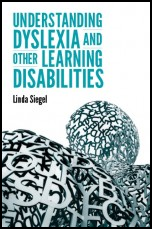Share This:
October 2013
By Louisa Moats, Ed.D.
 Understanding Dyslexia and Other Learning Disabilities
Understanding Dyslexia and Other Learning Disabilities
Linda Siegel
Pacific Educational Press
September 2013
Paperback. 296 pages.
ebook availability on publisher website
Linda Siegel has written a remarkable new book, Understanding Dyslexia and Other Learning Disorders, which I highly recommend for parents, administrators, teachers and clinicians. It is rare that a book can engage any and all of these audiences as well as this one. It is also surprising how well Professor Siegel, who is one of the most accomplished and widely published researchers in reading, language, and learning disabilities, can abandon academic jargon and conventions so effectively in favor of accessible, engrossing narratives about people with learning disabilities.
Dr. Siegel’s approach promotes “understanding” by taking us deep inside the lives and minds of famous people, fictional characters, and ordinary individuals. With evident scholarship, she confirms that Einstein was not dyslexic, but Picasso and William Butler Yeats were. Agatha Christie, Winston Churchill, and Hans Christian Andersen suffered from other kinds of learning disabilities. Jane Austen and George Eliot portrayed learning disorders in their fictional characters with uncommon insight for any era. But the voices that leave the most indelible mark on us readers are those of the many individuals Dr. Siegel quotes – the voices of children, parents, adults, and teachers who have been profoundly affected by dyslexia or other learning disorders. Most of these individuals articulate, in one way or another, acute anxiety, shame, isolation, and lingering social and emotional challenges related to learning disabilities. We gain special insights from their words, especially the children from Singapore who were taught to use metaphors for their conditions: Dyslexia is a “crawling snail…you need to work harder and faster.” “ Dyslexia is a “broken toilet bowl…everything leaks out.” “Reading and writing…is a hard rock, because it’s very hard to read and very hard to spell.”
Laced within empathy-building case studies and vivid depictions of the daily struggles of individuals with learning disabilities is critical information from scientific research. With reference to a large body of evidence, Siegel argues against IQ testing as a requirement for diagnosis of a learning disability. Without apology, she shines a harsh light on educational practices and policies that stymie parents and advocates who are trying to ease the fearsome challenges facing individuals who struggle with learning. After constructive discussions of helpful coping strategies, teaching practices, technology supports, and accommodations for individuals with learning disabilities, she states there is “no excuse for failing to identify the problem early, providing good teaching, and trying to understand the strengths of people with learning disabilities.” With this book, we have another valuable tool for stimulating progress toward those worthy goals.
Linda Siegel, Ph.D., is the Dorothy Lam Chair in Special Education at the University of British Columbia. Dr. Siegel is an eminent psychologist, educator and internationally respected authority on reading and learning disabilities. Dr. Siegel is the Editor of IDA’s Perspectives on Language and Literacy.
Louisa Moats, Ed.D., is President of Moats Associates Consulting, Inc. She has been a teacher , psychologist, researcher, author, graduate school instructor, and board member of the International Dyslexia Association for many years. Dr. Moats is recognized as a national and international expert in the fields of reading, spelling, language, dyslexia and professional development for teachers.
Copyright © 2013 International Dyslexia Association (IDA). We encourage sharing of Examiner articles. If portions are cited, please make appropriate reference. Articles may not be reprinted for the purpose of resale. Permission to republish this article is available from info@interdys.org.

